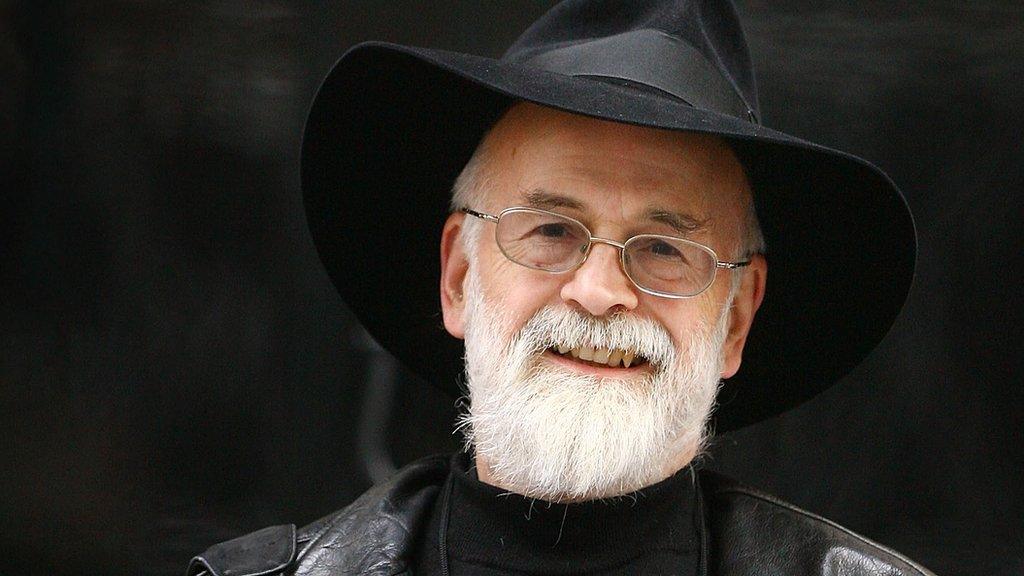Obituary: Sir Terry Pratchett
- Published
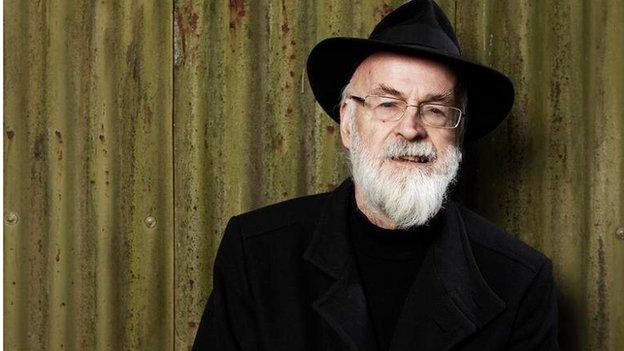
Terry Pratchett: Master of humorous fantasy
Terry Pratchett proved that it was possible for a world to be flat.
He first created Discworld in 1983 because he wanted to "have fun with some of the cliches" of fantasy novels.
Pratchett's whimsical writings endeared him to millions of avid fans across the world.
But in later years he fought a much-publicised battle against Alzheimer's disease.
Idyllic childhood
Terence David John Pratchett was born on 28 April 1948 near Beaconsfield in Buckinghamshire.
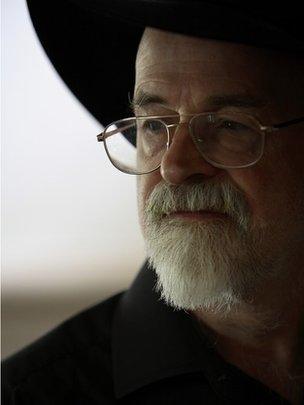
Pratchett was born in 1948 near Beaconsfield
An only child, he spent his early years in a house with no running water or electricity but he said that the family never felt deprived.
"It was right after the war, so that if you had a house with a roof on it you were ahead of the game," he said.
Pratchett later remembered an idyllic childhood spent playing with other village children in the local fields and woods.
He vividly recalled a visit to London in 1954 when his mother took him to the Gamages department store in Holborn.
The small boy was overcome by the bright lights and vast range of toys. "Lots of my future writing started to happen on that day," he later said.
An early interest in astronomy was sparked when he began collecting a series of cards in Brooke Bond Tea packets entitled Out into Space.
Computer fan
When his parents bought him a telescope, he spent hours out in the dark garden, peering into the sky.
Pratchett was also an avid reader and The Wind in the Willows became a major influence on his later writing, together with his growing collection of sci-fi books.
He left school at 17 and got a job as a trainee reporter on a local newspaper where, among other things, he wrote children's stories under the pen name Uncle Jim.
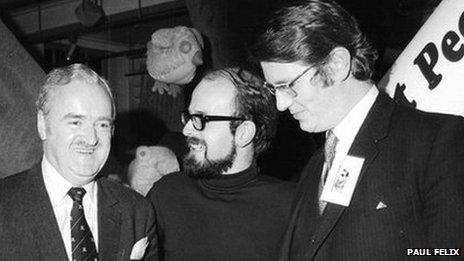
Pratchett (centre) at the launch party for The Carpet People in 1971
Out of one of these columns, written in what would become his trademark whimsical style, came the characters that eventually populated his first book.
His breakthrough came in 1968. While interviewing a publisher, Peter Bander van Duren, he casually mentioned he had been working on a manuscript.
Van Duren and his business partner Colin Smythe read the draft and The Carpet People was published in 1971.
According to Smythe, the book received few reviews, but they were ecstatic, with one describing it as "of quite extraordinary quality".
Nuclear power
Pratchett followed this up with his only two purely science-fiction novels, The Dark Side of the Sun, published in 1976, and Strata five years later.
The latter work introduced the concept of a flat world, something that would surface again in Pratchett's most popular series of novels.
"Nothing in the universe is 'natural' in the strict sense of the term," Pratchett said of Strata. "Everything, from planets to stars, is a relic of previous races and civilisations."
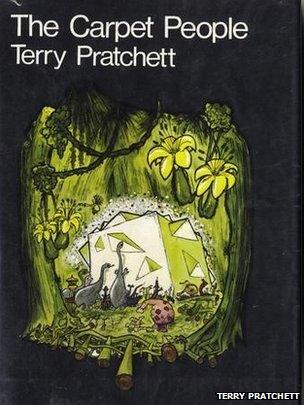
He illustrated his first published novel
Pratchett was a great computer fan, writing his earlier novels on an Amstrad word processor before switching to a PC as the technology improved.
Loath to abandon the security of a full-time job, he continued to work as a journalist before becoming a press officer at the Central Electricity Generating Board.
He had responsibility for three nuclear power stations and began his new post, with "impeccable timing", just after the partial meltdown of the reactor at Three Mile Island in the US.
"About every Friday one of the reactors would blow up - again," he joked later in an interview with the Scifi.com website.
"It was my job to say, 'Well, we didn't leave much radioactivity. You could barely see it!'"
In 1983 Pratchett published The Colour of Magic, the first in what would become the Discworld series of books.
Confident
It was more a collection of short stories than a novel but, boosted by a serialisation of the story on the BBC's Woman's Hour, the paperback edition, released in 1985, established Pratchett's reputation.
"The nature of Discworld gave me the opportunity to do all kinds of things," he said. "I could fit more or less anything into it. By about book four, I discovered the joy of plot."
By the time that fourth Discworld book, Mort, was published in 1987, Pratchett felt confident enough to become a full-time writer.
While Discworld remained at the centre of Pratchett's output, by 2013 he had published 40 novels in the canon while also writing some horror fiction and a number of children's books.
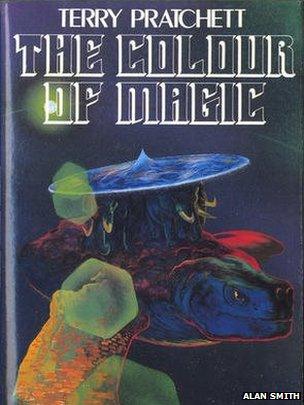
His style of writing was nothing if not eccentric. He avoided chapters where possible, on the basis that they broke up the narrative, and peppered his text with footnotes.
Pratchett also used punctuation as a source of humour. His character Death always conversed in capital letters while the auditors of reality eschewed quotation marks.
He drew heavily on real people for many of his characters. Leonardo da Vinci, for example, became the painter and engineer Leonard of Quirm.
Many of his works were adapted for the stage and animated versions of some of his children's stories, including Truckers, have appeared on TV.
He fought a running battle against critics who said fantasy could never be considered as literature.
"Stories of imagination," he said witheringly, "tend to upset those without one."
Choosing to die
Away from writing he maintained an interest in astronomy and natural history.
He became a campaigner to promote the conservation of the orangutan and the librarian in Pratchett's Unseen University found being the shape of an orangutan ideal for his work.
In 2007, Pratchett announced that what had been thought were the symptoms of a mild stroke were in fact the signs of early-onset Alzheimer's disease.
In a public statement headed "An Embuggerance", the author assured fans that "this should be interpreted as 'I am not dead'. For me, this may be further off than you think."
Pratchett, determined to battle the disease, donated half a million pounds to an Alzheimer's research charity and set about trying a number of possible cures.

He chronicled his illness in the BBC programme Living with Alzheimer's
He made a two-part documentary for the BBC, Living with Alzheimer's, in which he learned more about the disease and discussed its effect on his life and writing.
Pratchett became a campaigner for assisted suicide in 2009 , the same year in which he was awarded a knighthood for services to literature.
The following year he was chosen to give the BBC Richard Dimbleby lecture on the subject Shaking Hands With Death.
The words had to be delivered by the actor Tony Robinson as the disease had affected Pratchett's ability to read.
Pratchett also introduced a BBC documentary entitled Terry Pratchett - Choosing to Die, which won an award at the Scottish Baftas.
Despite his illness he continued to write, either using word recognition software or dictating his words to an assistant.
In an interview with the Mail on Sunday in 2009 he was sanguine about his prospects.
"I intend, before the endgame looms, to die sitting in a chair in my own garden with a glass of brandy in my hand and Thomas Tallis on the iPod, the latter because Thomas's music could lift even an atheist a little bit closer to Heaven.
"Oh, and since this is England, I had better add, 'If wet, in the library.' "
- Published12 March 2015
